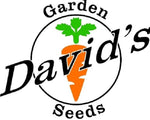Seed Types

Who says cauliflower has to be white? Here are several types with pretty colors and designs.
We have several seed types available here at David's Garden Seeds®. Some of our seeds are a combination of several types. For instance an open pollinated seed can also be organic and an heirloom.
Some out there, like a certain major food chain, labels all open pollinated seeds as heirlooms. This is not true. While there is no standard for heirlooms, it is generally accepted that any seed developed before 1950 and is open pollinated is an heirloom.
Below you will find brief descriptions of each type of seed.
Seed Types
Heirloom Seeds
We offer many heirloom seeds from all across the country. Heirloom seeds are seeds that generally have been around for 75 years or more. There is no standard for what makes a seed "heirloom" like there is for what makes it "organic".
Heirlooms are usually better tasting than hybrids but are usually harder to grow and more susceptible to insects and diseases. But many of these can be avoided if using a good organic growing program.
These are also open pollinated types meaning they will reproduce themselves. While all heirlooms are open pollinated not all open pollinated seeds are heirlooms.
Seed Types - Organic Seeds
Organically grown seeds means they have been grown without using man-made (synthetic) chemicals.
Seed Types - Open Pollinated Seeds
Open pollinated seeds are seeds that will reproduce themselves. These are the ones you want to grow to save for future plantings. All heirloom seeds are open-pollinated, but not all open-pollinated seeds are heirlooms.
If you plan on producing your own seeds, you will need to do some studying to make sure you have planted them so they will not cross pollinate. There is nothing wrong if they do, you just will not get the "pure" open pollinated seeds to produce more plants.
Seed Types - Hybrid Seeds
Hybrid seeds refer to seeds where the breeder has taken characteristics of different attributes of plants of the same family and combined them to make a plant that grows better, has more disease resistance and so on. They will reproduce but the reproduction will not be an exact copy of itself. And there is no telling what you will get.
Hybrid seeds are not genetically modified organisms (GMO) so you do not need to worry when you see the word "Hybrid" (F1) on a package of seeds.
October 2019 I have found out that there is a Hybrid 2 (F2).
Here is what I have found out. The F2 hybrids are seeds they have been taken from hybrids and planted. Then when the vegetable forms, they pick the ones that are close to what they are looking for.
For instance they may grow the F1 hybrid seeds from a tomato plant. Then grow seeds from it which will become F2 plants. The F1 is referred to as the parents. When you grow the F2 you are actually growing the grandparents. So what you will get is really hard to tell.
There may be a difference in size, shape, color, taste and disease resistance.
GMO Seeds
GMO (genetically modified organisms) seeds occur when the breeder has taken different attributes of different families of seeds, thus changing the DNA make-up of the new seed. There is a lot of controversy over whether this is right or not. Currently the only vegetables they have done this with are corn varieties and squash varieties.
Update: There are several more GMO vegetables out there. One of these is a tomato. A purple one. One of America's favorite seed companies had been mis-informed and mis-led into believing this was a purple heirloom.
Anyway instead of admitting they had been duped they just came up with excuses. Admitting they had been duped would have been far better than they story they concocted.
All of the seeds at David's Garden Seeds® are Non-GMO seeds.
In fact, David's Garden Seeds® has taken The Safe Seed Pledge.
No Cheap Seeds
If you are looking for cheap seeds, THIS IS NOT THAT SITE. We offer premium, fresh seeds that are hand-packed in the United States by our team members. We use highly complex machines in packing our seeds. We print all of our own envelopes in house. We do all of our own shipping.
Germination Rate
Most of our vegetable seeds have an 80% or better germination rate. Where the germination rate is lower it is stated in the description of the particular seed. Flowers are at 70% or better.
There are a few that are 50% or below. We inform you of this in the listing.
Germination rate will go down as the seeds get older. We are talking three to five years and many will be viable even after five years.







Typically after between 6 to 15 backcross sections for consistent characteristics a hybrid becomes a homogenized stabilized cultivar ie f6 through f12 hybrid
I just moved to TX and this is my 1st year at trying to have a garden here. The ground here in the panhandle is really bad { I have had great gardens in MI and KY} I’m doing raised beds because of all the prickly weeds {which is all there is} I bought seeds from WalMart for this year but may go another route next year. Do you have a catalog I can order so I can plan for next year?
Nevermind the first email I stumbled on this and it answered my question.
Leave a comment